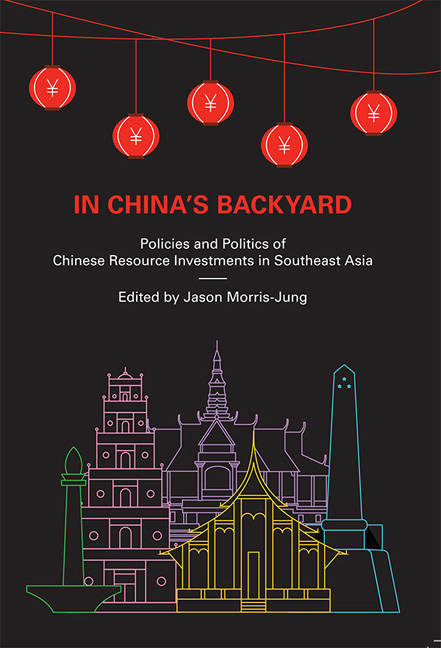Book contents
- Frontmatter
- Contents
- Foreword
- Acknowledgements
- About the Contributors
- 1 Introduction
- 2 Mixed Motivations, Mixed Blessings: Strategies and Motivations for Chinese Energy and Mineral Investments in Southeast Asia
- 3 Mineral Resources in China's “Periphery” Diplomacy
- 4 Energy Entanglement: New Directions for the China–Indonesia Coal Relationship
- 5 Indonesia–China Energy and Mineral Ties: The Rise and Fall of Resource Nationalism?
- 6 The Direction, Patterns, and Practices of Chinese Investments in Philippine Mining
- 7 Development Cooperation with Chinese Characteristics: Opium Replacement and Chinese Rubber Investments in Northern Laos
- 8 The High Cost of Effective Sovereignty: Chinese Resource Access in Cambodia
- 9 Complex Contestation of Chinese Energy and Resource Investments in Myanmar
- 10 Anti-Chinese Protest in Vietnam: Complex Conjunctures of Resource Governance, Geopolitics and State–Society Deadlock
- 11 Complexities of Chinese Involvement in Mining in the Philippines
- 12 Conclusion
- Bibliography
- Index
8 - The High Cost of Effective Sovereignty: Chinese Resource Access in Cambodia
Published online by Cambridge University Press: 04 July 2018
- Frontmatter
- Contents
- Foreword
- Acknowledgements
- About the Contributors
- 1 Introduction
- 2 Mixed Motivations, Mixed Blessings: Strategies and Motivations for Chinese Energy and Mineral Investments in Southeast Asia
- 3 Mineral Resources in China's “Periphery” Diplomacy
- 4 Energy Entanglement: New Directions for the China–Indonesia Coal Relationship
- 5 Indonesia–China Energy and Mineral Ties: The Rise and Fall of Resource Nationalism?
- 6 The Direction, Patterns, and Practices of Chinese Investments in Philippine Mining
- 7 Development Cooperation with Chinese Characteristics: Opium Replacement and Chinese Rubber Investments in Northern Laos
- 8 The High Cost of Effective Sovereignty: Chinese Resource Access in Cambodia
- 9 Complex Contestation of Chinese Energy and Resource Investments in Myanmar
- 10 Anti-Chinese Protest in Vietnam: Complex Conjunctures of Resource Governance, Geopolitics and State–Society Deadlock
- 11 Complexities of Chinese Involvement in Mining in the Philippines
- 12 Conclusion
- Bibliography
- Index
Summary
Foreign aid and economic investment have been effective tools used byChina to leverage influence in many developing countries, includingCambodia. China is now the largest aid donor and investor to Cambodia.Despite positive aspects of China's presence, which include an increaseof FDI inflow, infrastructure development, and economic growth, China'ssubstantial investment in natural resource sectors also comes withsignificant costs. As one of the largest holder of economic land concessions,mining licenses and hydro dam construction projects, Chinese companies,often partnering with local companies and elites, have been involved withillegal land grabbing, deforestation, and human rights abuses. These issueshave prompted countless outcries and protests from local peasants, civilsocieties and international community. In addition, opposition parties inCambodia have leveraged these issues to accuse the ruling Cambodia People'sParty (CPP) of promoting a pro-China policy. This chapter explores thecomplex issues that have emerged around Chinese investment in Cambodiannatural resources. First, the chapter analyses structural factors in the Sino–Cambodian relations that have generated a favourable investment climatefor Chinese resource companies. Second, it investigates various recurringproblems emerging around resource sector projects of Chinese companies inCambodia. Lastly, the chapter evaluates the benefits and costs brought alongby Chinese investment in natural resource extraction in Cambodia with aview to preventing the fallouts of such investment in the future.
Introduction
If China has been “going global” since the early 2000s, it has gone regional for far longer. China's Cold War-era influence in Southeast Asia prior to the 1980s is well documented, after which both foreign and domestic difficulties led to a period of relative withdrawal. Since the end of the Cold War in the early 1990s, however, China's foreign policy toward its southern neighbours has increasingly re-embraced its outwardly engaged version of “peaceful coexistence”, as first articulated in the 1950s. Seeking both regional political stability and, perhaps more pointedly, access to natural resources for its own ongoing economic development, China's leaders are widely understood to see Southeast Asia as a strategic sphere of influence. In such a context, they have looked to development cooperation as a core mode of regional engagement for much of the last two decades.
As a key locale of this strategy, Cambodia receives close attention from Beijing, given its pivotal position in the region. Since 1996, the relationship between Phnom Penh and Beijing has deepened.
- Type
- Chapter
- Information
- In China's BackyardPolicies and Politics of Chinese Resource Investments in Southeast Asia, pp. 182 - 203Publisher: ISEAS–Yusof Ishak InstitutePrint publication year: 2017

